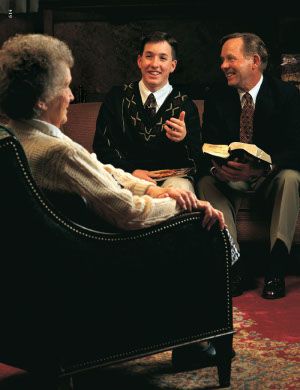 Introduction: This was written at the request of my home teacher. Spoken word and tradition seem more important than written accounts. I prefer writing. In this short essay I have placed some critical phrases that probably mean more to me than to someone who has only heard them. Those who have read my sources or my journal / blog summaries over the past eight years might gain from this. Otherwise, I hope this is an intriguing introduction.
Introduction: This was written at the request of my home teacher. Spoken word and tradition seem more important than written accounts. I prefer writing. In this short essay I have placed some critical phrases that probably mean more to me than to someone who has only heard them. Those who have read my sources or my journal / blog summaries over the past eight years might gain from this. Otherwise, I hope this is an intriguing introduction.
A Few Salient Points on Which Perhaps we can Agree
Most people I know are good, meaning they want to do good things, help others, and enjoy happiness in life. Their actions are based on their beliefs. Most people fit this mold. To do otherwise would be untrue to yourself and leads down the path of sorrow. I was asked to relate this story. I will be as concise as possible.
A faith is a set of practices based on a set of beliefs. Our early forebears set out to the new world believing God had something better in mind for them other than the repression of being controlled by others. Nobody likes that. We each have an inborn desire for freedom. Our history, past and current state teach this.
In other words, this life is a journey, either physical, mental or spiritual, but today, mostly spiritual. Let’s forget politics for now. This post is not about that subject. You don’t have to be LDS or Mormon to appreciate this but it helps. Christian or Muslim, Hindu, Buddhist, Jewish, and the list goes on. We are human beings.
We live on the same planet. We see the same goodness and evil. Most of us hate war. I do. Yet we believe in protecting ourselves. Most of us believe in freedom, yet we detest forcing our beliefs on others. I do. You believe what you want about God, life after death, the purpose of life, and why things happen to you each day.
I believe what I chose to believe about these same subjects. After nearly sixty years I have seen direct comparisons expressing sincere love and being downright mean. I don’t like to cause people to feel uncomfortable. That’s why I don’t argue, yet I stand up for truth by example. I strive to be someone other people can like.
 What Led Me to Be Intrigued by Alternate Voices
What Led Me to Be Intrigued by Alternate Voices
Let’s get personal. You may have been born a Catholic or a Muslim. I was born a Presbyterian on my mother’s side and a Baptist on my father’s. I didn’t see much difference back then, although I do now, having studied each for many years. My family, led by my mother, found and joined the LDS Church when I was just five.
I didn’t take it seriously – just went along. It was no big deal for me. I became a Mormon. So what? To me, it was just Christianity, although, not so much at first. I was taught – mostly by good, dedicated women – to be kind, unselfish, peaceful, and especially to change my ways when they brought unhappiness into my life.
In other words, I leaned about repentance or change. When I was about sixteen, I was a bit rebellious. This period lasted about six months. I did not like the feelings of unhappiness I felt – cognitive dissonance we would call it today. So I decided to do something about it. I decided to practice the orthodox teachings of my faith.
I became your typical Mormon. Before that, I was just a teenager who sometimes made bad choices and learned I didn’t like the results. Now I began to make some very purposeful choices typical of a Mormon. I went to an LDS University. I went on an LDS foreign mission. I dated and married an LDS girl, in a local LDS temple.
I tried to be orthodox. For forty years I did everything I was asked, gave of my time and money to the institution and believed as the modern published manuals taught. I noticed an unusual thing, even in the short forty years I was LDS. Things were changing. I mean specific beliefs and teachings found in the LDS doctrines were noticeably changing.
Keeping Your Eyes Open Can Be a Dangerous Thing
 It was subtle at first and not really important or far-reaching into the lives of my fellow believers. Over time, especially over the last seven to ten years, they have become radical, very noticeable and very contrary to what we used to believe and to practice. I suppose the most evident has been the intense focus on following and obeying the hierarchy.
It was subtle at first and not really important or far-reaching into the lives of my fellow believers. Over time, especially over the last seven to ten years, they have become radical, very noticeable and very contrary to what we used to believe and to practice. I suppose the most evident has been the intense focus on following and obeying the hierarchy.
It even got to the point where those who asked questions, simple questions about why we did things a certain way, were brought under pressure by local leaders for raising such questions. Heresy was the correct word that should have been used, but things change slowly in the Church. Asking questions made one an apostate.
Desiring to follow the counsel of the hierarchy, I began to write publically. Over time I suppose I became bolder in sharing what I was discovering in my studies. I read, I studied, I prayed and I wrote. Soon I found I was accused of being a gadfly, a troublemaker, because I pointed out how things had changed over our history.
One day, I has told I was “taking potshots at the Brethren.” If there was a moment in my journey that caused me to reconsider my dedication to the LDS Church, it was that moment. I thought long and hard about that comment from a trusted leader. I was flabbergasted, really, and wondered what he meant. I was simply studying. I write and publish as I study.
I read, I pondered, I prayed, I meditated, I wrote, I shared, I did what I thought my leaders wanted me to do, especially Elder Ballard who issued the challenge to be involved in the online dialog about the LDS Church. In my eight years of blogging about the LDS Church I was honest and sincere in what I wrote, or so I thought.
 There’s Always Someone Hated by the Orthodox
There’s Always Someone Hated by the Orthodox
I was introduced to the writings of an individual whom I recognized had taken many of the same subjects I had pondered and presented them in such a way I could not deny he communicated the subjects in the way the Lord wanted them presented. I read, I studied, I pondered, I prayed, and the Lord answered.
And now comes the dilemma. What do you do when he Lord says one thing and the leaders of the Church who claim to be His say another? Do you trust man or do you trust God? I chose to believe what I felt in my heart, or more accurately, what I felt the Lord speak to me in my mind. I did what I felt the Lord wanted me to do.
Immediately the arguments started from those who loved me: “You have been deceived. This man is a liar. His words contradict the scriptures.” NO, I studied his words. They contradicted the LDS Church handbook, and much tradition, not what I believed to be scripture, including The Lectures on Faith, which were and are canonized as scripture.
And there’s where I’ll leave this short explanation requested of my home teacher as to why I resigned from the LDS Church. The key to my heart and conversion lies in those two points: The Church Handbook replaced the Lectures on Faith. One is canonized and another secretly hidden from most members of the LDS Church.
After twenty-five years of serving in LDS Church Leadership positions where we read and studied the handbook more than the scriptures in our leadership meetings, I came to the conclusion the LDS Church is led by man, and NOT by God, at least not by the God who spoke to me during my studies and prayers.
The big question is, or course, is whose voice did I hear when my prayers were answered? Was I deceived? You’ll have to decide that for yourself. I decided to demonstrate my beliefs when I resigned and was baptized. I did that specifically to show I accepted the writings, teachings and the work of the Lord’s servant.
A Few Final Questions to Determine Further Interest
 Of course, you must answer for yourself: Who is the servant of the Lord today?
Of course, you must answer for yourself: Who is the servant of the Lord today?
God bless you each and every one as you sincerely ponder this critical question.
Is there a man you trust more than you trust the voice of God when you pray?
Is your faith based on tradition and not on what you have heard from the Lord?
Finally, this one: Can tradition save you or does it take meeting with a saved being?


Yes I see the conundrum here. These
questions are crucial brother.
Beautiful and concise post. Peace
be with you brother.
The actual content of the Church Handbook of Instructions is nearly irrelevant. But the interpretation of the handbook by the given leader or leaders is supreme. For example, one leader might interpret a CHI passage as a flexible guideline, or maybe in the sense of Joseph Smith’s teaching “that which is wrong under one circumstance, may be, and often is, right under another.” But another leader may claim that the CHI, as written by “living prophets,” is absolute and has much greater authority than the “dead prophet’s standard works.”
Well did the possum Pogo say “We have met the enemy and he is us.”
Jesus Christ in the New Testament tried to teach the people to follow the higher laws of the gospel, rather than the rule-bound, oral traditions of the Pharisees.
Tom Irvine
Very nice Tim. Thank you.
It is so good to read your writing once again. I have missed you, even though I see you post on facebook sometimes. I still miss this blog and everything I learned here. I miss though days of intense study that included this blog. I know you have your reasons for not posting here much anymore, but be assured, you are loved and supported in many little corners of the world. You’re welcome in mine any time.